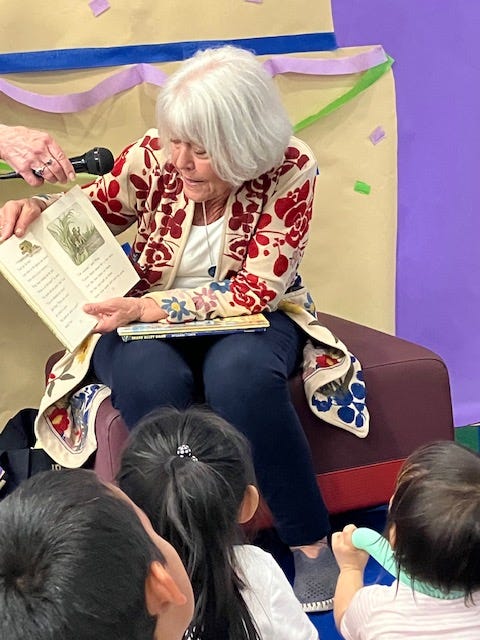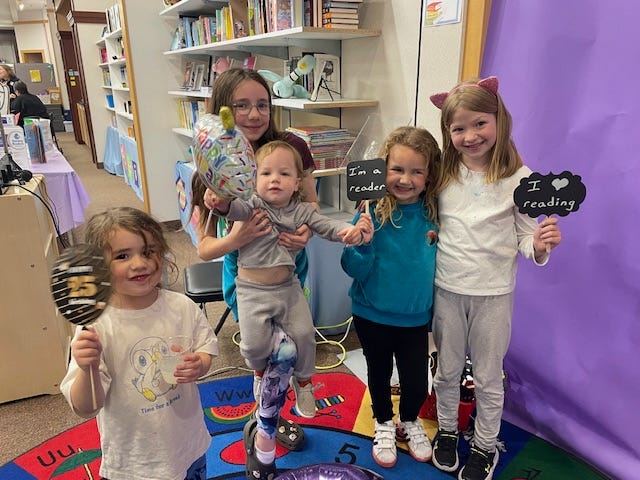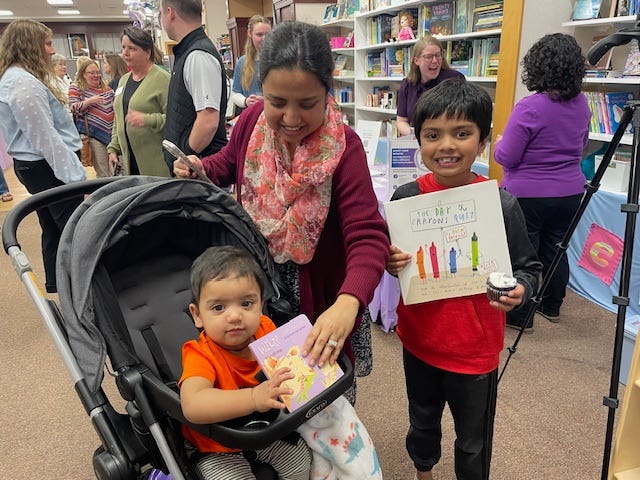“Gramma Christie, I’m going to read you a book. You read it to me, first. I’ll memorize it and read it back,” said five-year-old Amelia.
“You don’t need me to read it first. You can do it yourself,” I replied. And she did.
It was an easy reader titled TAP. In all it had about twelve words. She made each letter sound, then put them together to make the word. It was magic! You’ve all experienced the magic, or you wouldn’t be reading this column.
How nice, you think, another story about a child learning to read. Maybe later. There’s housing, tariffs, and the next election to consider.
Democracy Starts Here
For me, a child learning to read is where democracy starts. If you want to save democracy, as many people do right now, then spend a few minutes thinking about an act that seems so simple but is, in fact, one of the most intellectually complex exercises a person can experience.
For eight years as Iowa’s First Lady, I traveled the state saying over and over, “Please read to a child. It may be the best part of your day.” In a place like Iowa, I shouldn’t have to ask, I thought. Doesn’t everyone care about teaching kids to read? These days I’m not so sure.
“Teaching a child to read is a science,” said Rebecca Rhodes, my reading specialist colleague at USAID. “According to the Science of Reading, there is no one area of the brain solely responsible for reading—it requires a great deal of collaboration. The parietal-temporal region enables a reader to break down words into sounds while the temporal lobe is responsible for language comprehension. The occipital-temporal region is critical for reading and automaticity. The frontal lobe controls the processing of speech sounds.” Reading teachers know how to help children get all of these lobes working together.
Traveling to 20 developing countries around the world as Senior Advisor for International Education at USAID, helped me put reading in a different perspective. 250 million children in the world don’t know how to read. Some live in fledgling democracies. Others live in countries where democracy has never existed. Our country believed that investing in teaching children to read, especially girls, would make those countries safer and more prosperous. As a result Americans would be safer and more prosperous.
That job opened my eyes and helped me to understand just how fortunate I had been to be born in the United States, a place that valued democracy and public education as its foundation. I was also fortunate to grow up in Iowa, a place that has more public libraries than any other state and used to be first among all states in reading scores.
LET’S RAISE READERS!
When people I encounter fret about the fate of our democracy, I think they expect me to suggest donating to a candidate, holding a sign at a protest, writing a letter to the editor, or posting and resharing defiant texts online. Certainly, all of these are short term avenues for exercising our First Amendment rights.
But if you’re not inclined to public protest, don’t want to risk your job to do so, or just can’t get out there any longer, here are a few other long-term ways to save our democracy: read to a child you love; volunteer at a school to read with a child who needs practice; send a check to a non-profit that supports early reading; write a post or an op-ed about an experience you had at a library as a child or as an adult; publicly support your school’s teacher-librarian and your community librarians. Read some banned books to see what you think. Offer to serve on an advisory board at your local library. Lobby your elected officials about retaining resources for early childhood programs like Head Start, which is now in jeopardy.
In Iowa we boast that we are #1 in the production of corn, soybeans, hogs, eggs, and a leader in wind energy. In terms of economic development, good jobs and keeping our children here in Iowa, we should be just as vigilant about raising readers. One county in Iowa has been doing just that, and how appropriate that it’s Story County. This month they’re celebrating 25 years of Raising Readers in Story County. I was there at the beginning, and last week I was in Ames for its 25th birthday party.
In 2000, my literacy foundation, Stories 2000, asked libraries across the state to survey their patrons to see what their community was already doing to support reading, to identify gaps in their services, and then commit to filling a gap. With help from substantial contributions from Iowa Rotarians and The Verizon Foundation, I was able to offer financial resources and an AmeriCorps volunteer, retired teacher Steve Person, working for my foundation, to help carry out their plans.
Over 30 communities participated. One partnered with a local radio station to read books aloud so that blind people could enjoy them. Storm Lake worked to encourage Latino families to use the library. Keokuk and several others created community events to encourage preserving local and family history. Jeri Heid, retired Ames children’s librarian who attended the Raising Readers birthday party last week reminded me that she participated in Stories 2000 as a librarian in Cherokee and Clive.
STORY COUNTY’S 30,000 BOOKS
I first met Carolyn Jons and librarian Carol Elbert in 2000 at the Ames Public Library for a meeting with community leaders about starting their Stories 2000 literacy project. Carolyn was active in the Ames Morning Rotary Club and since Rotarians state-wide invested in my foundation, she wanted to involve her club’s volunteers in the Ames project. Last week Raising Readers in Story County surprised Carolyn with the annual award usually given to a volunteer. Carolyn was a catalyst but not a one-woman show. She certainly embodies the community spirit that has kept this non-profit going for 25 years.
Today every child in Story County has access to exceptional, ongoing literacy services. As Executive Director Kristi Mayo said at their celebration last week, “Over the past quarter-century, we’ve placed books in little hands, shared countless stories, partnered with families, educators, and volunteers—and together, built a culture that values early literacy as the foundation for lifelong successes.”
Last year alone they provided 30,000 books to children across the county. The reading scientists will tell you that’s important, because kids can’t learn to read if they don’t practice with different and more challenging books. That requires resources.
CAROLYN JONS FINDS COMMON GROUND
The Partners are too countless to name, but Mary Greeley Medical Center was a founding donor. McFarland Clinic hosts the Reach Out and Read program that engages pediatricians like Dr. Jill Alexander in giving books to children and parents who come for their well-baby check-ups. Read Out and Read is one of the most long-lived, effective literacy programs in this country. I was honored to serve on its national board. My interaction with their programs across the country was the impetus for starting my own foundation to promote literacy in Iowa. There are over 100 Read Out and Read clinics in Iowa that could use your help.
I enjoyed reading to children at the new headquarters for Raising Readers in the North Grand Mall in Ames, where families, elected officials, reading specialists, doctors, and donors gathered to celebrate their commitment to the county’s future.

You can’t support the Constitution if you can’t read and interpret it. You can’t vote intelligently if you can’t read and distinguish fact from fiction. You can’t engage in conversation about local issues that affect your family if you can’t “walk in the shoes” of your neighbors next door, across the country, or around the world. Reading helps with that.
I leave you with words from Raising Reader founder Carolyn Jons, an Iowan who believes in finding common ground. “Together we are working toward a future in which generations of young children get a solid foundation that prepares them to become successful students, adults and contributing citizens.”






‘What’s your library? Say hello for me, and thanks for taking the time to respond
You must read to lead! And, educated citizens make the best citizens. Thank you!